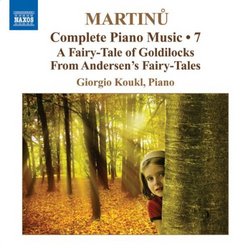| All Artists: Mohuslav Martinu, Giorgio Koukl Title: Martinu: Complete Piano Music, Vol. 7; A Fairy-Tale of Goldilocks fron Andersen's Fairy-Tales Members Wishing: 0 Total Copies: 0 Label: Naxos Original Release Date: 1/1/2009 Re-Release Date: 8/25/2009 Genres: New Age, Classical Styles: Instrumental, Chamber Music, Historical Periods, Classical (c.1770-1830) Number of Discs: 1 SwapaCD Credits: 1 UPC: 747313202577 |
Search - Mohuslav Martinu, Giorgio Koukl :: Martinu: Complete Piano Music, Vol. 7; A Fairy-Tale of Goldilocks fron Andersen's Fairy-Tales
 | Mohuslav Martinu, Giorgio Koukl Martinu: Complete Piano Music, Vol. 7; A Fairy-Tale of Goldilocks fron Andersen's Fairy-Tales Genres: New Age, Classical The discovery of several manuscripts of works previously unperformed, unknown or believed — lost has allowed Giorgio Koukl to extend his acclaimed series of Martinu's piano music for — Naxos. This seventh volume includes ten... more » |
Larger Image |
CD DetailsSynopsis
Product Description The discovery of several manuscripts of works previously unperformed, unknown or believed lost has allowed Giorgio Koukl to extend his acclaimed series of Martinu's piano music for Naxos. This seventh volume includes ten world première recordings. While the inspiration for From Andersen's Fairy Tales seems clear enough, the 'Goldilocks' of his other youthful fairy tale set was probably a girl with whom he fell in love. The remaining short pieces help to complete the portrait of this frequently underrated composer, his life and unsettled times. Similar CDs
|
CD ReviewsEven More Newly Discovered Martinu Piano Works J Scott Morrison | Middlebury VT, USA | 08/26/2009 (4 out of 5 stars) "The fourth CD in this series was expected to be the last one. But since that time enough new and previously unknown piano music by Martinu has been discovered that the present CD, then, is the seventh in the series. And by now Giorgio Koukl, the pianist who has also written the booklet notes, is not willing to say the series is finished yet. Be that as it may, this new issue has just appeared and it contains ten first recordings. The first two works on the CD are early works based on fairy tales. 'A Fairy Tale Goldilocks' (1910), in four movements, apparently has no connection with the British and American Goldilocks fairy tale, but rather was probably inspired by an unhappy love affair of the composer, the woman involved being 'Goldilocks.' The thing that struck me about this music is how much is sounds like Janácek in whose operas fraught repeated melodic fragments are such a recognizable fingerprint. The six movement second suite -- the movements are Polonaise, Intermezzo, Novelette, Barcarolle, Arabesque, Valse mignonne -- is called 'From Andersen's Fairy Tales' (1912) contains altogether happier music. I have some sense that these simpler pieces may have been written for pedagogic purposes. They sound less like the mature Martinu than the earlier works. And they are delightful.
'Ballade' (1912), subtitled 'Chopin's Last Chords', is certainly Chopinesque but I don't hear any specific chords that come from any Chopin works that I know. It is followed by seven characteristic pieces -- 'Merry Christmas' (1941), 'The Little Lullaby' (1919), 'La Danse' (1929), 'Le train hanté' ('The Haunted Train') (1937), 'Prélude' (1921), 'Foxtrot' (1920), 'Spring' (1921) -- that trace to some degree Martinu's development as a composer. Certainly the latest of these, 'Merry Christmas', is a happy piece that makes use of sassy bitonality and ear-catching harmonic progressions characteristic of Martinu's later years. 'La Danse' is influenced by Stravinsky's neoclassic style. 'The Haunted Train' is not about a train per se, but about a ride at the 1937 Paris World Exposition. The loosey-goosey 'Foxtrot' reminds us of the enormous interest in American popular dance forms in the Europe of the 1920s. The impressionistic 'Spring' is influenced by Ravel and Debussy. Another suite of pieces 'Detské skladby' ('Children's Pieces') (1932) are charming teaching pieces that are not perhaps as easy as the title suggests. Each lasts less than a minute. The final work here is the humorously titled 'Avec un doigt' ('With One Finger'). It calls for a third hand (here supplied by pianist Chiara Solari) playing a single note over and over, and it lasts only forty-one seconds. You may find yourself laughing out loud. As in the previous discs in this series, Koukl shows himself to be a fine pianist who is completely inside Martinu's sound world. This may not be the most important disc of the series, but it certainly is a lot of fun. Scott Morrison " |





